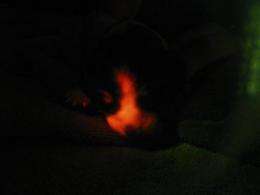SKorean experts claim to have cloned glowing dogs

(AP) -- South Korean scientists say they have engineered four beagles that glow red using cloning techniques that could help develop cures for human diseases. The four dogs, all named "Ruppy" - a combination of the words "ruby" and "puppy" - look like typical beagles by daylight.
But they glow red under ultraviolet light, and the dogs' nails and abdomens, which have thin skins, look red even to the naked eye.
Seoul National University professor Lee Byeong-chun, head of the research team, called them the world's first transgenic dogs carrying fluorescent genes, an achievement that goes beyond just the glowing novelty.
"What's significant in this work is not the dogs expressing red colors but that we planted genes into them," Lee told The Associated Press on Tuesday.
His team identified the dogs as clones of a cell donor through DNA tests and earlier this month introduced the achievement in a paper on the Web site of the journal "Genesis."
Scientists in the U.S., Japan and in Europe previously have cloned fluorescent mice and pigs, but this would be the first time dogs with modified genes have been cloned successfully, Lee said.
He said his team took skin cells from a beagle, inserted fluorescent genes into them and put them into eggs before implanted them into the womb of a surrogate mother, a local mixed breed.
Six female beagles were born in December 2007 through a cloning with a gene that produces a red fluorescent protein that make them glow, he said. Two died, but the four others survived.
The glowing dogs show that it is possible to successfully insert genes with a specific trait, which could lead to implanting other, non-fluorescent genes that could help treat specific diseases, Lee said.
The scientist said his team has started to implant human disease-related genes in the course of dog cloning, saying that will help them find new treatments for genetic diseases such as Parkinson's. He refused to provide further details, saying the research was still under way.
A South Korean scientist who created glowing cats in 2007 based on a similar cloning technique said that Lee's puppies are genuine clones, saying he had seen them and had read about them in the journal.
"We can appraise this is a step forward" toward finding cures for human diseases, said veterinary professor Kong Il-keun at South Korea's Gyeongsang National University. "What is important now is on what specific diseases (Lee's team) will focus on."
Lee was a key aide to disgraced scientist Hwang Woo-suk, whose breakthroughs on stem cell research were found to have been made using faked data. Independent tests, however, later proved the team's dog cloning was genuine.
©2009 The Associated Press. All rights reserved. This material may not be published, broadcast, rewritten or redistributed.

















